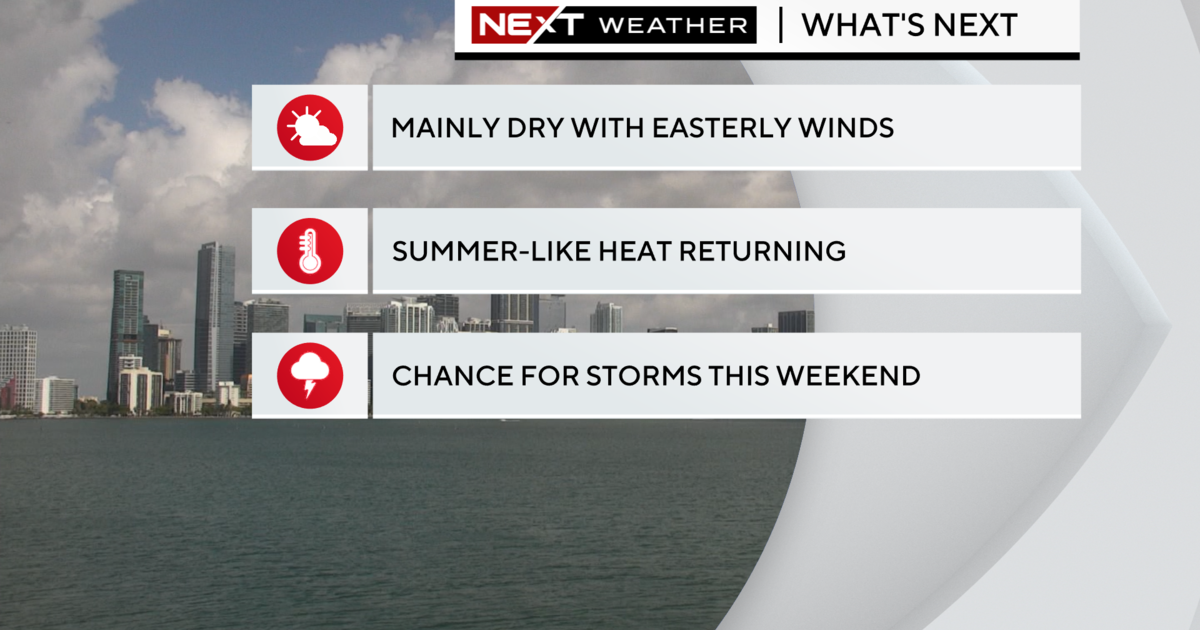'It's Been Life Altering': Florida's Female Snake Hunter Stalks Swamps For Invasive Burmese Pythons
MIAMI (CBSMiami) – How would you like to get paid to catch snakes? The Florida Fish and Wildlife Conservation Commission is offering to pay you hundreds, even thousands of dollars if you are willing to do it.
Hiring snake hunters, or surveyors as they call them, is FWC's answer to an exploding population of non-native Burmese pythons in the Everglades.
CBS4's David Sutta recently went on a snake hunt and was quite surprised to see just who's out in the glades catching snakes.
When Sutta met up with Anne Gordon Vega, she was holding onto what looks like a pillow case. She then reached in carefully.
"I'm going to locate his head," Gordon Vega explained.
She pulled a snake out and stretched it out for display.
"This is about a 7-foot Burmese," she said. "And he's in a little bit of a defensive mode right now."
Two years ago, she wouldn't have dreamed of doing this. Now, it is second nature.
Sutta asked her if she ever thought she would hunt pythons.
"Not in a million years. Our team is made up of an odd assortment of people from all walks of life," she said with a laugh.
Gordon Vega is a semi-retired artist, wife and mother. She can add Florida Fish and Wildlife's rising star to her titles.
She is the record holder for catching the most pythons in the Everglades.
"Who would think?" she says with a smile.
Her husband thinks it's nuts, but understands it. Her son is proud.
"My 21-year-old he brags about me because how many guys can say their mom is out there wrestling monsters in the middle of the night," she said.
Gordon Vega is part of a bizarre mix of people spending their days and nights roaming the Everglades searching for invasive pythons.
Tom Rahill operates a group called "Swamp Apes." The organization takes veterans out hunting for snakes as a form of therapy.
While most people might imagine only guys are picking up the python hunting craft, Rahill says that notion is easily dispelled.
"It's not a macho thing that people expect to see swampy looking dudes like me," he said. "There are talented women just like any profession, as many women as there are men."
And they are coming from all walks of life.
Amy Siewe was living in Indiana when she heard about the opportunity to search for snakes. A self-proclaimed herpetologist she jumped at the opportunity.
"I was a real estate broker and investor for 13 years. So I just moved to Florida to catch snakes," Siewe said.
She realizes it sounds crazy but she explains this is her passion.
Siewe, Rahill and Gordon Vega are some of the dozens of people now participating in Florida Fish and Wildlife's program targeting Burmese pythons.
First spotted in the Everglades 40 years ago, the population has exploded. No one knows how many are out here, but their food source, the native animals, are disappearing.
Melissa Miller is the coordinator for Interagency Python Management for FWC. She explained they currently gauge the problem by the dwindling native population.
"They (the snakes) consume mammals, birds, even reptiles. And we have seen pretty dramatic declines in those species," she said.
Here's what python hunters make:
- $8.46 an hour just to look
- Hard to reach areas of the Everglades bump you up to $15 an hour
- If you find a snake, you'll get $50 for one under four feet
- Beyond 4 feet it's $25 a foot
- Find a nest and you can collect $200
"They can lay up to 100 eggs. So, every snake that is removed from the environment is going to be helping," Miller said.
To date, nearly 1,000 snakes have been turned in.
Gordon Vega has turned in some monster size snakes.
"I caught four deer eaters, and two of those I was all by myself," she said. "And I'm not going to tell you how old I am, but I am not 20 anymore. So, having a good technique is a good idea."
Deer eaters? That means the snake is big enough to eat a deer – 13, 14, 15 feet long.
Gordon Vega catches them, often by herself.
Rahill pulled open another pillow sack to show Sutta. The snake inside was caught the night before.
Gordon Vega warned him to watch out. Sure enough, the snake started biting feet and legs, anything it can reach. Rahill was covered up so he doesn't feel a thing. Nevertheless, it's exciting in the moment.
"Oh, he is a biter" Rahill yelled.
Typically, pythons are pretty calm. Every now and then they can get quite feisty. Wrestling snakes over 100 pounds that can fight for up to 15 minutes takes a certain kind of person.
"That's where the adrenaline rush comes in, and I was terrified when I first started doing this," Gordon Vega explained. "Now? I feel like I can do it and I'm not afraid anymore."
During the summer the snakes can be found along berms at night. The hunters have special lighting rigged on their trucks. They cruise until they spot something that looks like a snake.
Related: New High Tech Camera Could Help Florida In Fight Against Invasive Burmese Pythons
Gordon Vega scanned the dark grass.
"If there was a 12-foot python here you might only see this much of it," she said motioning to Sutta. "But it's that pattern and a little bit of shine. We tease a lot, beer bottle, snake, stick, snake."
There are a lot of false alarms and misses. If they stumble upon an iguana, another non-native, some hunters will try to catch them too.
Rahill jokes, "There could be more iguanas in South Florida, and this saying a lot, than New Yorkers."
After hours of driving, they come up empty handed on this night. But Anne is not discouraged. She is out her living her best life snake hunting.
"It's really been life altering. I'll come out here night after night. I'll be out sometimes three, four nights a week," she says with a smile.
The good news is they won't be wondering in the dark for too much longer because the weather is changing. That means the snakes will likely be out and about during the daytime, which means the hunting will happen in clear daylight until around May.



